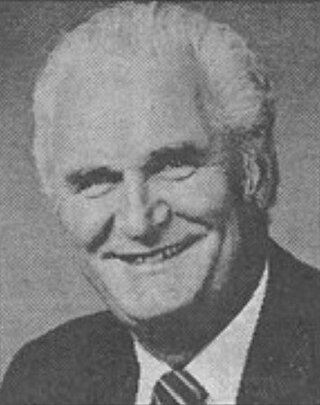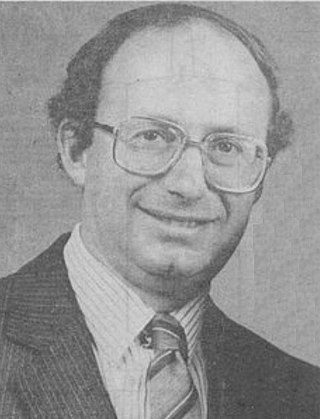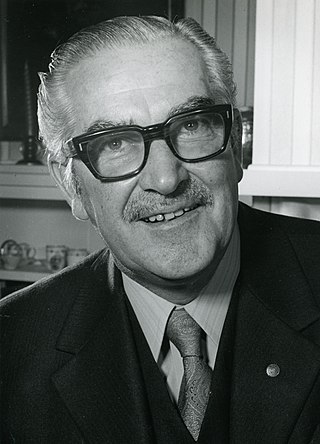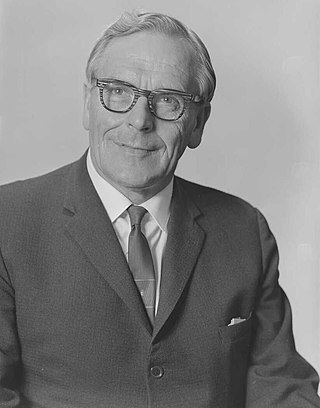
Sir Francis Joseph Kitts was a New Zealand politician. Originally from the South Island, he served in the military and later was a civil servant before entering politics with the Labour Party. He was the Member of Parliament for Wellington Central between 1954 and 1960. He was also the longest-serving Mayor of Wellington, holding the post from 1956 to 1974. He was also a member at various times of several other local bodies and was still an elected official at his death.

Robert Alexander Wright was the Mayor of Wellington from 1921 to 1925, and a New Zealand politician of the Reform Party.

Sir James Belich was a New Zealand local politician. He was the Mayor of Wellington from 1986 to 1992.

Ian William Lawrence was an Australian-born New Zealand lawyer, who served as the mayor of Wellington from 1983 to 1986.

Sir John Kennedy-Good was a New Zealand politician. He was mayor of Lower Hutt from 1970 to 1986.

The Hutt by-election of 1968 was a by-election for the electorate of Hutt on 3 August 1968 during the 35th New Zealand Parliament.

Percy Dowse was a New Zealand politician. He was mayor of Lower Hutt from 1950 to 1970.

The Hutt by-election was a by-election in the New Zealand electorate of Hutt, an urban seat at the bottom of the North Island. The by-election was held on 18 December 1929, and was precipitated by the resignation of sitting United member of parliament Thomas Wilford on who had been appointed the High Commissioner to the United Kingdom by Prime Minister Joseph Ward. The by-election was contested by Walter Nash of the Labour Party, James Kerr from the United Party and Harold Johnston of the Reform Party. The lead up to the by-election was marred by harsh words between candidates.
The 1921 Wellington City mayoral election was part of the New Zealand local elections held that same year. In 1921, elections were held for the Mayor of Wellington plus other local government positions including fifteen city councillors. The polling was conducted using the standard first-past-the-post electoral method.

The 1931 Wellington City mayoral election was part of the New Zealand local elections held that same year. In 1931, elections were held for the Mayor of Wellington plus other local government positions including fifteen city councillors. The polling was conducted using the standard first-past-the-post electoral method.

The 1935 Wellington City mayoral election was part of the New Zealand local elections held that same year. In 1935, elections were held for the Mayor of Wellington plus other local government positions including fifteen city councillors. The polling was conducted using the standard first-past-the-post electoral method.

The 1941 Wellington City mayoral election was part of the New Zealand local elections held that same year. In 1941, elections were held for the Mayor of Wellington and fifteen city councillors plus seats on the Wellington Hospital Board and Wellington Harbour Board. The polling was conducted using the standard first-past-the-post electoral method.

The 1944 Wellington City mayoral election was part of the New Zealand local elections held that same year. In 1944, election were held for the Mayor of Wellington plus other local government positions including fifteen city councillors. The polling was conducted using the standard first-past-the-post electoral method.
The Wellington Citizens' Association, was a right-leaning local body electoral ticket in Wellington, New Zealand. It was formed in 1911 by merging the selection process of council candidates of several civic interest groups and business lobby groups. Its main ambitions were to continue to control the Wellington City Council, reduce local spending and deny left-leaning Labour Party candidates being elected.

Helene Ruth Paula Ritchie is a former local body politician, registered psychologist and mediator, and a board member from Wellington, New Zealand. As Wellington's longest serving City Councillor of over 30 years, she led the Labour team to a majority position on the council. Later, she was the first female deputy mayor and chaired the Wellington Airport Authority and its successor for eight years.

The 1971 Wellington City mayoral election was part of the New Zealand local elections held that same year. In 1971, elections were held for the Mayor of Wellington plus other local government positions including fifteen city councillors. The polling was conducted using the standard first-past-the-post electoral method.

The 1986 Wellington City mayoral election was part of the New Zealand local elections held that same year. In 1986, elections were held for the Mayor of Wellington plus other local government positions including twenty-one city councillors. The polling was conducted using the standard first-past-the-post electoral method.

Sir John Francis Jeffries was a New Zealand local politician, civil servant and later a judge of the High Court.

John Gibbs Churchill was a New Zealand trade unionist and local politician. For six years he was the mayor of Otaki.















